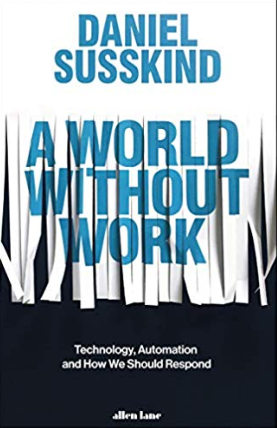
A thought-provoking study of new technology


New technologies have always provoked panic about workers being replaced by machines as advances in artificial intelligence mean that all kinds of jobs are increasingly at risk. So how can we thrive in a world with less work? Susskind reminds us that technological progress could bring about unprecedented prosperity, but the challenge will be to distribute prosperity fairly.
In economist Daniel Susskind’s latest book “A World Without Work: Technology, Automation and How We Should Respond”, argues that we are very near to a time when most human work will be displaced by machines as the humans and the extra-terrestrials who have been cloaked in shadow finally come eye to eye as they gaze each other, and understand each character as equal but diabolically separate forms of intelligence.
Susskind explains in his chapter titled “Understanding Machines”, about AlphaGo, the computer program developed by Google’s AI subsidiary DeepMind, which beat a world champion in the ancient Chinese game of Go. It won, not by playing better than the human, but by playing in a way that was inhuman.
“Almost as remarkable as its overall victory was a particular move that AlphaGo made – the 37th move in the second game – and the reaction of those watching. Thousands of years of human play had forged a rule of thumb known even to beginners early in the game, avoid placing a stone on the fifth line from the edge”.
Netscape founder and venture capitalist Marc Andreessen has famously bantered that “ software is eating the world” and that in the end, there will be only two types of people left, those who program the machines and everyone else.
The machines could come up with entirely new ideas about how to program themselves as we are heading a world in which human work will become obsolete – based on this supposition that most of the conventional notions about AI learning have been wrong.
“Economists had thought to accomplish a task, a computer had to follow explicit rules articulated by a human being – that machine capabilities had to begin with two down application of human intelligence”.
According to Susskind many machines are “now deriving entirely new rules, unrelated to those that human beings follow as machines are no longer riding on the coattails of human intelligence”.
We can teach ourselves out of the problem, neither by bolstering stem skills nor pushing liberal arts really addresses the big issue, which is that we need an education system that is not geared up to teach people how to enter the world of work, but rather how to make leisure productive.
Susskind expands many good ideas circulating about how to do that, from creating digital sovereign wealth funds to attribute economic value to work that is currently unpaid.
Susskind also highlights how robots replacing cheap and even higher-end labour, to the promise and perils of AI, to the ability of the state to buffer them.
A World Without Work: Technology, Automation and How We Should Respond by Daniel Susskind, Allen Lane £20, 336 pages.
